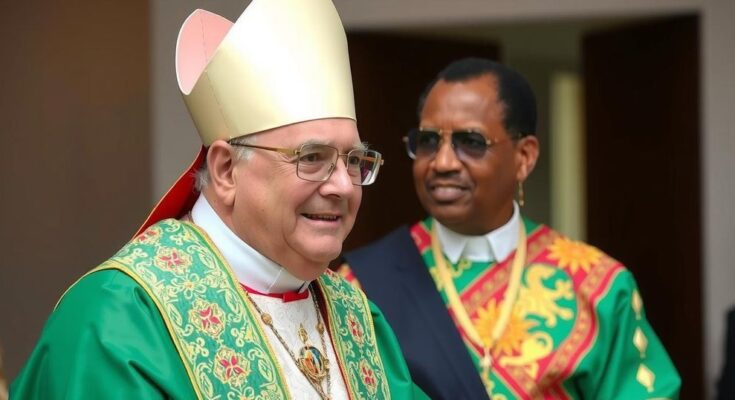Archbishop Samuel Kleda condemned the state of democracy in Cameroon, stating it exists only nominally. He criticized Elections Cameroon (ELECAM) for its alleged ties to President Biya’s party, echoing calls from opposition leaders for electoral reforms. As Cameroon faces socio-political challenges, demands for a truly democratic electoral process are intensifying ahead of the upcoming elections.
In an interview with Equinox TV, Archbishop Samuel Kleda of Douala expressed grave concerns regarding the state of democracy in Cameroon, asserting that it exists solely in name and not in practice. He lamented, “Before the vote, we already know who’s going to win. That’s not democracy.” This statement reflects a widespread sentiment in a nation led by President Paul Biya, who, at 91, is the world’s oldest head of state and has maintained his position since 1982 amid allegations of electoral fraud. Archbishop Kleda criticized Elections Cameroon (ELECAM), the organization responsible for overseeing voting processes, emphasizing that its independence is questionable as many of its members are affiliated with Biya’s political party.
Kleda’s concerns regarding the integrity of elections resonate with various opposition leaders, including Prince Ekosso of the United Socialist Democratic Party (USDP) and Muma Bih Yvonne of the Social Democratic Front. They have called for significant electoral reforms, such as the reduction of the voting age from 21 to 18 and the implementation of a single ballot paper to curb electoral fraud. The delayed declaration of election results, which often extends beyond a month, has led to suspicions of tampering, a sentiment echoed by many Cameroonians following recent elections.
The backdrop of this discourse is the challenging socio-economic landscape of Cameroon, where a significant portion of the population faces extreme poverty and ongoing regional violence. The Catholic Church, particularly under the leadership of figures like Archbishop Kleda, has historically played a vital role in advocating for human rights and democratic governance. In this context, there are growing calls for reforms that would facilitate a truly democratic electoral process, enabling all candidates an equitable opportunity to compete for public office, thereby reflecting the will of the people.
Cameroon has long been characterized by a centralized governance model under President Paul Biya, who has held power since 1982. This duration makes him both the longest-serving non-royal leader and the oldest head of state globally. The country has faced numerous challenges, including widespread poverty, allegations of electoral fraud, and ongoing civil strife, particularly in regions populated by English-speaking citizens. The Catholic Church has emerged as a key player in advocating for democratic values and human rights, standing against the pervasive governmental control of the electoral process.
The alarming assertions from Archbishop Kleda regarding the lack of genuine democracy in Cameroon highlight critical issues within the electoral framework and governance of the country. The calls for reform from both religious and political leaders reflect a collective yearning for a fair and transparent electoral process that upholds democratic principles. Consequently, as Cameroon approaches the next elections, the demand for changes that prioritize citizens’ rights and enhance the integrity of the electoral system becomes increasingly pertinent.
Original Source: cruxnow.com




